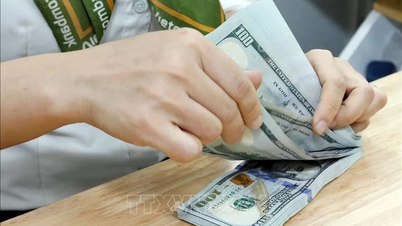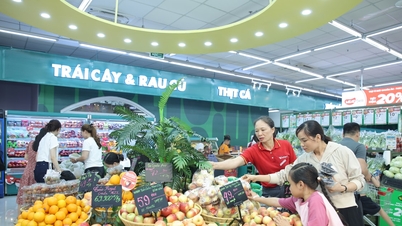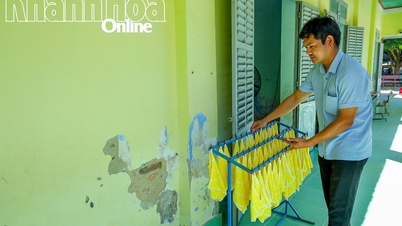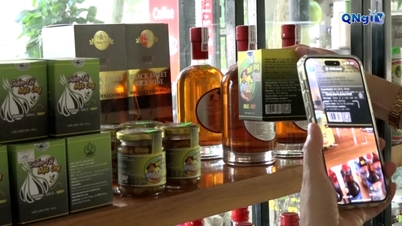In an era of global connectivity, personal data associated with international financial transactions is transmitted faster than ever before. Therefore, data protection requirements must also be placed at a higher level, becoming a key factor in the development of cross-border payments.
This is an issue emphasized by many experts at the workshop "Digital financial utilities for everyone: Cross-border payments, online loans" organized by the State Bank in coordination with Lao Dong Newspaper on September 11 in Hanoi .
Inevitable need and increased risk
Cross-border payments are becoming an inevitable need and an important driving force for global trade and investment. Tools such as international credit cards, cross-border e-wallets, and fintech services help transactions be quick, convenient, and connect millions of businesses and individuals around the world .
Mr. Nguyen Hoang Long - Deputy General Director of Vietnam National Payment Joint Stock Company (Napas) shared: “I had the opportunity to witness this firsthand during a recent business trip to China. Even though I had an international card, I still could not pay at a store in a shopping mall. The sales staff did not accept international cards, there was no card swiping device and only accepted payments via domestic e-wallets. In the end, I had to use cash to pay. Such situations make us more aware that: traditional payment tools, including international cards, are no longer effective means in many markets."
Mr. Long said that in Vietnam, the current payment ecosystem is still fragmented, international cards, domestic cards, e-wallets, QR Codes... exist in parallel but there is no effective cross-border connection. International tourists , especially those from China, Thailand, Korea... still face many difficulties when spending at small shops, markets, and sidewalk cafes - places that do not accept cross-border digital payments.
Meanwhile, Vietnamese businesses have not been able to fully utilize the spending flow of international visitors due to the lack of compatible payment infrastructure. This not only creates barriers for tourists but also causes Vietnamese businesses to miss out on a large amount of spending flow from foreign visitors. Therefore, connecting cross-border payments is an urgent requirement if we want to develop tourism, services and digital commerce.
Currently, Napas has deployed connections with Thailand, Cambodia, Laos, Indonesia, Singapore, etc., creating conditions for people on both sides to make direct payments in each country's local currency.
Currently, Napas is completing the connection with China. This will allow Chinese tourists to use the application and their domestic bank accounts to make direct payments in Vietnam. The system is expected to be tested in the last 3 months of the year.

Delegates also said that along with this development, the issue of network security and personal data protection is also raised to a higher level. Some incidents in the world have shown that when financial data and personal information are illegally exploited, it not only causes economic losses but also affects user confidence. Attacks are often for financial gain, such as trying to steal money or exploit credit card and e-wallet information.
According to Mr. Vu Ngoc Son - Head of Research, Consulting, Technology Development and International Cooperation (National Cyber Security Association), the difference in standards between countries, along with the huge transaction volume, makes detecting abnormalities and ensuring safety even more challenging. This requires financial institutions to invest more heavily in technology, processes and international cooperation to build a multi-layered shield for cross-border payments.
“Only by synchronously combining advanced technology, strict security management, human training, clear legal framework and international cooperation can we effectively protect personal data and ensure the safety and sustainability of the global payment system,” Mr. Son emphasized.
Data protection is not a feature, it's a mindset
According to Mr. Son, data protection is not a feature, but a consistent mindset.
He said that the differences in standards between countries and the huge volume of transactions make it difficult to ensure data security. Therefore, financial institutions need to build a “multi-layered shield” based on technology, governance, legal and international cooperation.
This expert believes that data protection is not an add-on feature but a consistent mindset. Payment service providers need to minimize data, apply the principle of “least privilege,” conduct regular audits, and enforce accountability with integration partners. For users, safety starts with habits: no scanning of floating QR codes, no payment via public Wi-Fi, enabling two-factor authentication, and limiting the limit for first-time transactions.

Therefore, according to Mr. Son, it is necessary to focus on specific behaviors such as carefully checking the recipient's information before confirming, enabling two-factor authentication and notification of changes, prioritizing small limits for first-time transactions, and locking the application immediately when the phone is lost. At points of sale, data security must also be ensured. Payment devices need to be sealed, codes changed periodically, and operations must be clearly authorized. At the same time, support channels and complaint handling times must be made public and transparent so that users can feel secure when making transactions.
Associate Professor, Dr. Pham Thi Hoang Anh (Banking Academy) also emphasized that cross-border transactions require a clear bilateral legal framework, unified technical standards and a coordination mechanism for handling incidents. Early standardization will reduce conflicts when risks arise, while ensuring trust for users and businesses.
According to Ms. Hoang Anh, personal data needs to be protected from the minimum steps such as strict authorization, monitoring access logs, deleting or anonymizing when the purpose of use is no longer needed. For management agencies, the priority is to harmonize the law according to international practices such as GDPR (EU) or ISO/IEC 27001. When the law, technology and operation are "in sync," personal data will be truly protected, creating a safe foundation for expanding cross-border digital payments./.
Source: https://www.vietnamplus.vn/thanh-toan-xuyen-bien-gioi-bao-ve-du-lieu-ca-nhan-can-la-chan-nhieu-lop-post1061279.vnp






































![[Photo] Prime Minister Pham Minh Chinh receives Secretary of Shandong Provincial Party Committee (China) Lin Yu](https://vphoto.vietnam.vn/thumb/1200x675/vietnam/resource/IMAGE/2025/9/26/821396f0570549d39f33cb93b2e1eaee)




































































Comment (0)